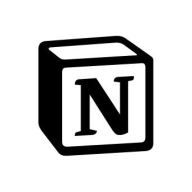

Notion and Linear operate in different sectors; Notion is tailored for note-taking and organization, whereas Linear is built for project management and issue tracking. Linear's features are notably advanced, making it a strong contender in project management, even with higher pricing, while Notion's affordability and flexible functions are positively acknowledged.
Features: Notion offers flexibility in note-taking, comprehensive databases, and collaboration tools. Linear provides agile project management features, such as precise issue tracking and efficient workflows.
Ease of Deployment and Customer Service:Notion ensures intuitive deployment with community support. Linear offers straightforward deployment with specialized customer assistance.
Pricing and ROI: Notion presents cost-effective solutions with high ROI for small to medium teams. Linear, though priced higher, offers substantial ROI through advanced project management capabilities.

Linear is a modern tool that enhances team productivity by streamlining workflow and task management. It provides a dynamic environment for tracking projects, managing tasks, and fostering a collaborative team culture.
Focused on efficiency and collaboration, Linear caters to teams aiming for high performance. It has intuitive design and powerful features that allow for seamless project management. The interface is uncluttered, promoting ease of use, and the platform integrates fluidly with existing workflows. Teams benefit from simplified task tracking, and the collaborative features ensure everyone stays aligned. Linear's adaptability makes it ideal for managing complex projects while maintaining a clear overview of progress and priorities.
What are the key features of Linear?In industries like software development and design, Linear's ability to integrate with existing workflows and track real-time progress makes it indispensable for agile teams. Its robust features support project scaling while maintaining clarity and coordination, essential for innovation-driven sectors.
Notion is an all-in-one workspace that enables teams to collaborate, organize, and manage their work effectively. Its primary use case is to streamline project management, knowledge sharing, and task tracking. With its versatile functionality, Notion allows users to create and customize databases, wikis, and documents, making it a powerful tool for organizing information.
The most valuable functionality of Notion lies in its flexibility and ease of use. Users can create and link various types of content, such as text, images, files, and even embed external resources. This enables teams to centralize their work and collaborate seamlessly, eliminating the need for multiple tools. Notion's drag-and-drop interface and intuitive editing features make it accessible to users of all technical backgrounds.
Notion helps organizations by fostering transparency, improving productivity, and enhancing knowledge management. By providing a centralized platform for collaboration, teams can easily access and contribute to shared projects, reducing communication gaps and ensuring everyone is on the same page.We monitor all Project Management Software reviews to prevent fraudulent reviews and keep review quality high. We do not post reviews by company employees or direct competitors. We validate each review for authenticity via cross-reference with LinkedIn, and personal follow-up with the reviewer when necessary.